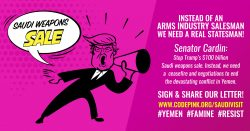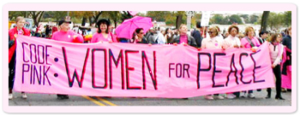Trump’s Saudi Trip Should Not Be to Clinch Arms Deal But to End Yemen War

By Medea Benjamin
President Trump’s trip to Saudi Arabia is designed to highlight his “art of deal” by clinching a massive $100 billion arms deal. But instead of using his presidency to be a salesman for the arms industry, Trump should be a statesmen for the suffering Yemenis. He should use his visit to press for a ceasefire and negotiations to end the conflict in Yemen.
This is not the first time American politicians have been pushing Saudi arms sales. U.S. weapons dealers have been selling weapons to the kingdom for decades. Sales reached a new climax under President Obama, as Saudi Arabia became the largest purchaser of U.S. weapons. The Obama administration bragged that it had sold $115 billion dollars worth of weapons during its eight years.
 Trump, with just four months under his belt, seems anxious to outdo Obama’s record. His $100 billion deal could mushroom into $300 billion over the next decade. Amnesty International has urged Trump not to sign off on new weapons sales, warning the weapons could be used to devastate more civilian lives in Yemen and could “implicate your administration in war crimes.”
Trump, with just four months under his belt, seems anxious to outdo Obama’s record. His $100 billion deal could mushroom into $300 billion over the next decade. Amnesty International has urged Trump not to sign off on new weapons sales, warning the weapons could be used to devastate more civilian lives in Yemen and could “implicate your administration in war crimes.”
The war in Yemen is now in its third year and has resulted in an epic tragedy of destruction and starvation. Twenty people are dying every day, many of curable diseases because barely 45 percent of the health facilities are functioning. A UNICEF report shows over 400,000 Yemeni children suffering from severe acute malnutrition, and a child dying every 10 minutes from malnutrition, diarrhea and respiratory-tract infections.
Jan Egeland, head of the Norwegian Refugee Council and one of the few foreigners to recently visit Yemen called the war “a colossal failure of international diplomacy” and said the crisis is now “of biblical proportions.” He pleaded with the U.S. government to get a real peace process going.


While President Obama approved Saudi weapons sales and provided logistical support to the Saudi intervention in Yemen, he began to have second thoughts when reports showed that the targets included schools, hospitals, marketplaces and other civilian sites. After the bombing of a funeral that left over 175 Yemenis dead, the Obama administration halted a pending weapons sale. It also refused to support a planned attack on the port of Hodeidah, where the bulk of the humanitarian aid enters Yemen. The Trump administration is reportedly ready to give a green light to an attack on the port.
Further escalation of the war in Yemen, particularly an offensive to seize Hodeidah from the Houthi rebels, will mean even more death and hunger for the Yemeni people. Jeremy Konyndyk, who was the director of foreign disaster assistance at US AID under Obama, said a serious disruption of the Hodeidah port could “tip the country into famine.”
Yemen imports 90 percent of its food, and the war, including a Saudi naval blockade and a previous bombing of grain silos at the Hodeidah port, has already made it difficult to import sufficient food and humanitarian supplies. Food shipments into Hodeidah have fallen precipitously, with only a few ships arriving each week compared to dozens before the war. Shipping lines are continuously pulling out due to the growing risks.

The Saudis intervened in Yemen in March 2015 to try to stop the Iran-friendly Houthis from coming to power. This aligns with Trump’s goal of cementing a Sunni Arab coalition to counter Iran’s influence in the region. The Arab gathering that will happen during Trump’s Saudi trip may set the stage for an “Arab NATO” that would be responsible for policing the region, but would further isolate Iran and inflame regional tensions.
Trump should not use this trip to support Saudi Arabia’s aggressive agenda, aggravate Sunni-Shia tensions, and further enrich U.S. weapons makers. Instead, he should put a halt to weapons sales and press the Saudis to sit down with Iran and other regional players to find a political solution to the devastating regional conflicts, starting with Yemen.
At least 111 Trump companies have done business in 18 countries and territories across South America, Asia and the Middle East, a Washington Post analysis of Trump financial filings shows.
The business interests range from sprawling, ultraluxury real estate complexes to one-man holding companies and branding deals in Azerbaijan, Indonesia, Panama and other countries, including some where the United States maintains sensitive diplomatic ties.

Some companies reflect long-established deals while others were launched as recently as Trump’s campaign, including eight that appear tied to a potential hotel project in Saudi Arabia, the oil-rich Arab kingdom that Trump has said he “would want to protect.”
Ranking member of the Senate Foreign Relations Committee, Senator Cardin, is key to stopping the arms deal. Send an email to Senator Cardin: Stop Trump’s $100 billion sale of weapons to Saudi Arabia! Instead of more weapons sales, we need a ceasefire and negotiations to end the devastating conflict in Yemen. Don’t forget to share the image above on Facebook and Twitter.
Medea Benjamin is cofounder of CODEPINK and author of Kingdom of the Unjust: Behind the US-Saudi Connections. Medea and all CODEPINK Members want to help the children of Yemen. Please Join US!











Leave a Reply
You must be logged in to post a comment.